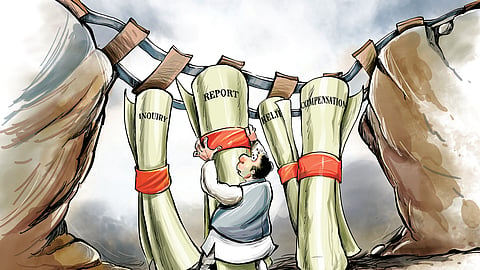

Three weeks after the stampede on February 15, which killed at least 18 at the New Delhi station, a tiny news item mentions the transfer of three senior railways officers. The inquiry committee investigating the stampede is yet to submit its report. The authorities have denied any connection between these transfers and the stampede. However, the same news item states that the “ministry appears to have taken the incident very seriously, albeit quietly”.
Herein lies the rub. Why are we so averse to taking responsibility and fixing accountability? Let us consider the history of our railways, one of the great marvels of engineering, management, human transportation—and employment. I agree that it would be uncharitable to call the Indian railways disaster-prone. But, as many experts readily admit, our safety record leaves much to be desired. The political fallout of this vulnerability has been significant.
We might recall that several railway ministers in India have resigned or offered to resign following railway accidents. The most notable was Lal Bahadur Shastri, who put in his papers in 1956 after two railway mishaps. The then prime minister Jawaharlal Nehru accepted his resignation after the second of these accidents in which over 150 passengers died in a bridge collapse near Ariyalur, plunging the train carrying them to a watery grave. Shastri’s reputation was saved; he went on to become India’s second prime minister.
Much more recently, Nitish Kumar resigned in 1999 after the Gaisal train collision in West Bengal. The Avadh Assam Express and the Brahmaputra Mail collided, killing 290 people due to a signalling error. In 2017, after the Kaifiyat Express and Puri-Utkal Express derailment, railway minister Suresh Prabhu offered to resign. Prime Minister Narendra Modi let him go after asking him to wait a month.
Some would even go so far as to suggest that if you want a railway minister to resign, engineer an accident. Let us look at the record of the current railway minister, Ashwini Vaishnaw. According to an answer to a question raised in parliament, data from 17 railway zones in the last five years shows that over 350 people died and more than 950 were injured in 200 railway accidents.
This isn’t a flattering performance or statistic. Yet, we know that some of these so-called accidents might actually have been acts of sabotage or mischief. That is why I want to make myself perfectly clear: I am not, like some opposition politicians, baying for rail minister Ashwini Vaishnaw’s blood.
In addition, it is only fair that the corrective measures announced by Vaishnaw’s ministry, including holding areas in major stations where overcrowding usually occurs, be duly acknowledged. But one wonders why, in the first place, should so many be allowed inside the station. Can’t entry be restricted as in airports? If non-experts can think of simple measures to prevent mishaps, especially during seasonal or other high-pressure occasions, why can’t those designated to ensure public convenience and safety do better?
The reason, I believe, is simple. As a nation, we are much more invested in deflecting blame than fixing the underlying problem. I venture to suggest that this tendency, by no means confined to the railways, is true in all spheres of the over-gargantuan government apparatus. To raise the issue to a much higher level, even when it comes to national security, from the debacle of the Chinese invasion in 1962 to Kargil in 1999, to 26/11 in 2008, to Pulwama in 2019, we never really know who is responsible for the lapses and what corrective measures have been taken. It is not that there have been no inquiry committees or reports, but their findings are usually suppressed or never allowed to be discussed, even in rarified sections of government, let alone civil society.
Isn’t this a hangover of the colonial mindset of an authoritarian government? We talk so much about decolonisation, but critical aspects of the colonial government machinery are far from being dismantled. Admitting blame, fixing responsibility, and taking corrective measures are part of the imperative chain of democratic governance that we are far from implementing. Yet, we keep boasting to the world that we are the mother of democracy.
Consequently, what we might rightfully expect from minister Vaishnaw and our government is to take responsibility and admit failures or lapses where they exist. Instead, if we go back to the very day of the stampede—Saturday, February 15—it would appear that there was a blatant attempt to spin the narrative by using its favoured news agencies right when the tragedy was unfolding. Till two hours after the incident, that is, 11.30 PM, neither the stampede nor the deaths were clearly admitted; instead, the nation was told that the situation was under control.
That the minister in question also controls the Information and Broadcasting Ministry possibly makes handling the tragedy more morally questionable. True, accidents or mishaps are, unfortunately, part of the broader challenges a country as vast and complex as India faces. But sadly, many of these tragedies are preventable because they are outcomes of incompetence, negligence, corruption, or sabotage.
That is why the subsequent handling of these incidents is so problematic. So many lives are lost, families destroyed, and innocent citizens hurt. But instead of sincere regret, let alone reckoning, there is a hyperdrive of damage control efforts. Ex-gratia payments are promptly announced, but more as sops to the survivors rather than means of owning up to the responsibility.
Sadly, the public, too, instead of demanding greater transparency and accountability from the government, looks to immediate relief and compensation from its mai-baap sarkar. This suggests we are low on governance standards and public trust as a country. If we want to strengthen Indian democracy, we must simultaneously learn to be more disciplined and responsible citizens while also demanding greater transparency and accountability from our elected representatives.
If we do not take responsibility and admit our mistakes, we risk repeating rather than correcting them.
(Views are personal)
(Tweets @MakrandParanspe)
Makarand R Paranjape | Author and commentator